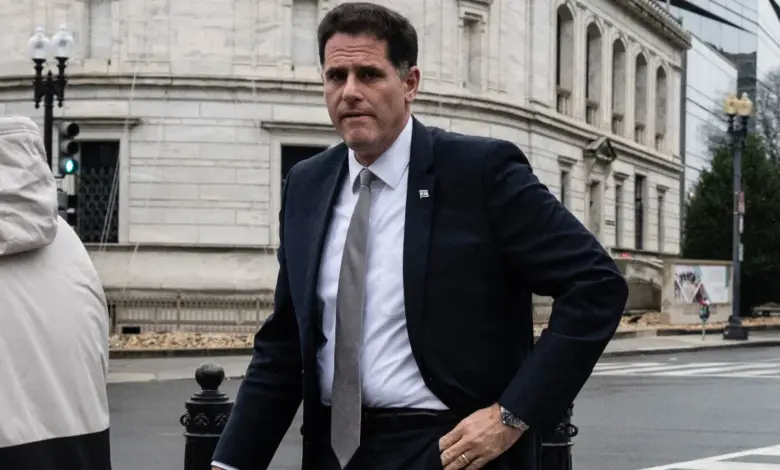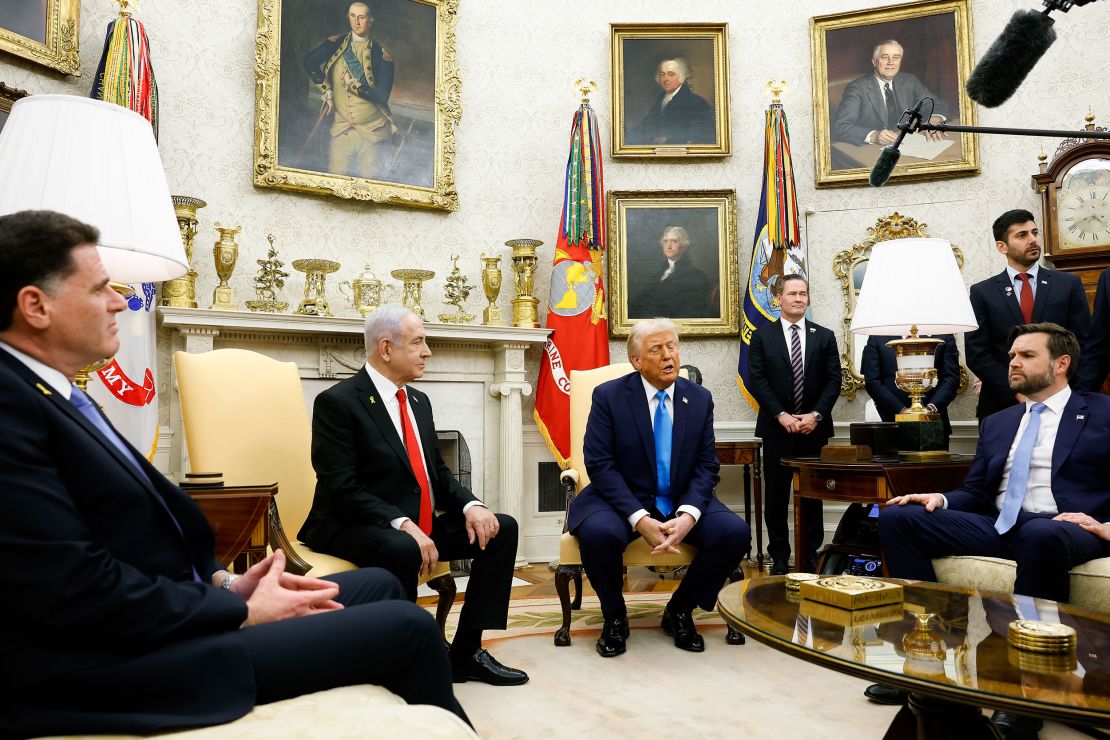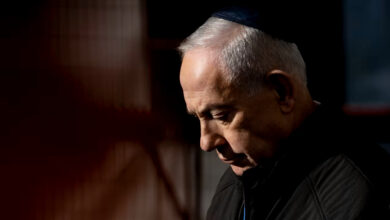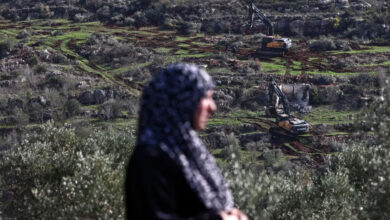
When discussions began over releasing Israeli hostages shortly after the October 7 attack by Hamas, the negotiators tasked to strike a deal were mostly intelligence and security professionals. But in February, Israel made an important change that those now involved say has had a profound slowing effect on the discussions to resurrect the broken ceasefire: The file was taken over by the prime minister’s closest political aide, Ron Dermer.
With Dermer, says a source involved in the negotiations, there’s a “significant difference in momentum,” from when Israel’s team was led by intelligence chiefs David Barnea and Ronen Bar.
“There is a clear shift in [Israeli] priorities,” the source said. “Negotiations are seemingly being politicized from the Israeli team.”
Now, Barnea, who directs the Mossad, has been sidelined and Bar, who ran the internal security service Shin Bet, has been fired by Prime Minister Benjamin Netanyahu, causing an uproar in Israel.
The decision to push aside career national security professionals in favor of Netanyahu’s closest adviser was intended to give Netanyahu more control over the negotiation process, an Israeli source familiar with the negotiations said.
“The political considerations of the Israeli team led by Dermer is not having a positive impact,” says an American who advocates for the families of Israeli hostages. “The families understand that Dermer is a big problem to getting their loved ones.”
An Israeli official pushed back on claims that Dermer’s position at the helm of negotiations has hampered progress or politicized the negotiations, saying, “Negotiations need to be judged by results, not process.”
“To reach a deal, you need someone who actually represents the will of the government that will authorize said deal, not ‘dissent,’ which only served to undermine negotiations,” the official said.
The fragile ceasefire between Israel and Hamas that started as President Donald Trump took office collapsed last month when Israel re-launched its military operations and US and Israeli officials accused Hamas of rejecting a deal to extend it, which Hamas denied.
There had long been indications Israel planned to resume its war against Hamas after the first phase of the ceasefire deal, when 38 Israeli and Thai hostages were released over six weeks.
Netanyahu regularly cites freeing the hostages as a top priority. But so is the destruction of Hamas, and critics have accused him of prioritizing the latter at the expense of the former, namely because that is also where the prime minister’s political interests lie.
Destroying Hamas has long been the priority of key right-wing members of Netanyahu’s governing coalition, who have invariably threatened and followed through on threats to quit the government.
With Dermer in charge of the negotiations, Netanyahu can more deftly manage the delicate political balancing act that has influenced Israeli decision-making at every critical turn of the ceasefire negotiations.
During the many months of ceasefire negotiations last year that ultimately led to a ceasefire deal in January, Israeli security officials balked at Netanyahu’s shifting positions and stall tactics that they believed were influenced by political considerations and delayed the brokering of a deal. But with Dermer now in charge and intelligence leaders marginalized, those dissenting views have featured less prominently in Israeli security discussions and in Israeli press reports.
While in the US to meet Trump earlier this week, Netanyahu rejected accusations that freeing the hostages isn’t a top priority.
“The president looked at me and told the journalists who were present: ‘This man is working constantly to free the hostages.’ I hope that this shatters the lie that is being circulated to the effect that I am not working for them, that I don’t care. I do care, and I am doing it and we will be successful,” Netanyahu said.

The Hostages and Missing Families Forum in Israel recently made a direct appeal to Dermer, whose title is the Minister of Strategic Affairs, accusing him of leaving them “in complete darkness.”
“When you were appointed as head of the negotiating team, we were promised that this would help reach a breakthrough on a new agreement,” the letter said. “In reality, more than a month has passed and there is no progress in sight.”
Barnea and Bar had regularly shuttled to Egypt and Qatar, as well as other countries, for ceasefire talks that included the heads of the CIA, Egyptian intelligence and the prime minister of Qatar.
Now Dermer speaks less with mediators from Egypt and Qatar, which maintain direct relationships with Hamas, according to the source involved in the negotiations.
The US point person has also shifted from the former CIA director to the Trump administration’s Middle East envoy Steve Witkoff, who has accused Hamas of intransigence that caused the recent ceasefire to break down.
“If you’re the Trump team, you blame Hamas but behind the scenes I believe they are trying to push both sides,” the American who works with the hostage families said.
A spokesperson for Witkoff said in a statement, “Ambassador Witkoff and the Trump administration are in lockstep with Israel in their pursuit of freeing the hostages, including American Edan Alexander, and achieving peace – which means Hamas out of power in Gaza. To achieve this, difficult negotiations are necessary.”
Ongoing negotiations to release hostages
Witkoff and US hostage envoy Adam Boehler have tried to figure out formulas to get Hamas to release the remaining Americans – one living and four dead – and get the truce extended enough to try to negotiate the next phase.
“The US is doing everything possible to release alive and deceased US hostages, which necessitates the deal,” said an Egyptian official. While Israel “doesn’t see hostages superseding breaking Hamas.”
Most recently, Hamas agreed to an Egypt- and Qatar-backed proposal that mirrored one Witkoff presented last month to release the lone living American hostage, Edan Alexander, along with four others and extend the peace through Ramadan and Passover.
Israel quickly countered, demanding 11 living hostages, almost half of the 24 remaining. That would more dramatically cut into what Hamas views as their greatest leverage over Israel.
“We’re still working on the Witkoff plan for an extension,” said a diplomat familiar with the discussions. “I think we have some wiggle room that we can work on.”
Israel had early in the ceasefire delayed launching negotiations for the second phase whose terms stipulated the release of all remaining hostages, a permanent ceasefire and a withdrawal by Israel’s military from Gaza.
That could have meant the survival of Hamas – even if not in power – and flown in the face of Netanyahu’s goal of “total victory.” It would also have threatened Netanyahu’s government.

Those second phase talks never began.
“There’s no clarity on the [Israeli] objective,” the first source involved in the talks said, adding: “Americans are getting impatient.”
As Israel’s latest operations have taken the death toll in Gaza over 50,000, there has been promising movement to resurrect the truce, those involved say.
Hamas is feeling the pressure, both from Israel’s military and widescale protests by Palestinians in Gaza, said a US official familiar with the negotiations.
“Hamas is struggling for oxygen,” said the official who accused Hamas of missing American opportunities last month to keep the ceasefire going. “They’re not very quick to move.”
The American working with the hostage families has felt “some air being breathed back into the process.”
“There’s a real sense of urgency and push on the part of the Americans and the [Egyptian and Qatari] mediators,” the source involved in the negotiations said.
To try to salvage the ceasefire, hostage envoy Boehler made an unprecedented move: meeting directly with officials from Hamas, which the US considers a terrorist organization.
That meeting angered Israeli officials, and reportedly Dermer in particular. Boehler confirmed he spoke with Dermer after and defended the meeting, telling CNN: “we’re not an agent of Israel.”
With much of Hamas’ leadership inside Gaza decimated, it’s not clear if the military leaders still fighting Israel are on the same page as the political leadership engaging with mediators, including Boehler, the source involved in the negotiations said.
“Stubbornness in Hamas also unhelpful. They need to account for the dire humanitarian situation in Gaza,” the source said.
Meanwhile, the discussions continue with the Israeli team led by Dermer, but which still includes security professionals working on the technical details.
“The Israeli team is putting a lot of effort, but the way it’s being managed tactically from the top,” the source said, “the current structure of the negotiation team is not as helpful as needed for progress.”
This story has been updated with comment from a spokesperson for Steve Witkoff.




